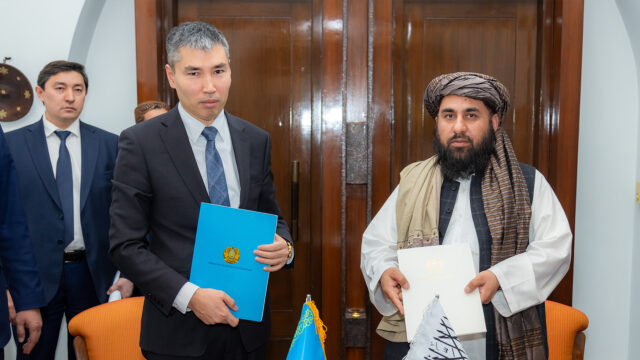
Kazakhstan and Afghanistan Sign Protocol of Intention on Railway Construction
Publication: Eurasia Daily Monitor Volume: 22 Issue: 84
By:

Executive Summary:
- Kazakhstan and Afghanistan signed a protocol of intent on April 24 to jointly develop the Turgundi–Herat–Kandahar–Spin Boldak railway, including a logistics hub in Herat and fiber optic infrastructure to support digital connectivity.
- The railway is one aspect of regional transport development that could transform Afghanistan into a vital transit corridor linking Central Asia to South Asia, offering Kazakhstan maritime trade access and potentially tripling cargo transport by 2030.
- The project reflects Kazakhstan’s growing engagement with Afghanistan, bolstered by the removal of the Taliban from its terrorist list and a projected $500 million investment.
On April 24, Kazakhstan and Afghanistan signed a protocol of intent confirming their interest in the construction of the Turgundi–Herat –Kandahar–Spin Boldak railway line. The agreement was signed during a visit to Kabul by a Kazakh delegation led by Deputy Prime Minister and Minister of National Economy Serik Zhumangarin. The protocol considers the possibility of a joint venture between the railways of Kazakhstan, Afghanistan, and Turkmenistan, operating under the jurisdiction of the International Finance Centre (Prime Minister of Kazakhstan, April 24). According to the deal, the next phase will include a formal cooperation agreement, in which Kazakhstan will participate in the construction of the Turgundi-Herat section of the railway line in Afghan territory. Additionally, both nations will sign an agreement for the construction of a transport and logistics center in Herat in southern Afghanistan (Astana Times, April 25). Another aspect of this rail project is to lay a fiber optic cable along the route. This will help develop digital infrastructure for better communications and safe train operations. This may enable communities along the route to have access to high-speed internet (Astana Times, April 25). The Taliban government claimed that Kazakhstan would invest $500 million in the railway project. Under the deal, a logistics and transport company would be created by Kazakhstan in Afghanistan’s Herat province to facilitate the implementation of the proposed railway project (Afghanistan International, April 21).
The Turgundi–Herat –Kandahar–Spin Boldak railway line, which aims to boost regional connectivity and trade, will stretch from Turgundi on the southwestern border of Turkmenistan through Afghanistan to Spin Boldak on the border with Pakistan. Afghanistan has the potential to become a key transit hub between Central Asia and South Asia (see EDM, May 21). The implementation of infrastructure projects, such as the proposed railway line connecting Central Asia with South and West Asia, could provide Central Asian nations with access to maritime trade routes. The new rail link has the potential of becoming the shortest route for cargo transportation from Central Asia to South and West Asia via Afghanistan. The project will help Kazakhstan enhance regional transit interconnectivity, strengthen transport and logistics links between Central and South Asia, potentially leading to access to Indian Ocean ports in South Asia (Prime Minister of Kazakhstan, April 24).
The railway line project was tri-laterally discussed in April 2024, when officials from Kazakhstan, Turkmenistan, and Afghanistan met in Kabul. At this meeting, officials agreed to build transit infrastructure in Afghanistan to open a new corridor connecting Central Asia with South and West Asia. The proposed Kazakhstan–Turkmenistan–Afghanistan transit corridor is supposed to serve as the key route for transporting goods from Russia and Belarus through Kazakhstan and Turkmenistan to Afghanistan, India, and the Middle East (see EDM, July 10, 2024). The corridor is expected to further strengthen the eastern branch of the International North-South Transport Corridor (INSTC) (Astana Times, April 29, 2024).
In July 2024, a railway line project was discussed at “North-South,” the first transport trade-export forum, in Aktau, Kazakhstan. Officials from Kazakhstan, Turkmenistan, and Afghanistan explored the possibility of constructing a new railway route. Mammetkhan Chakyev, head of the Agency for Transport and Communications of Turkmenistan, proposed a joint venture of Kazakhstan and Turkmenistan for the construction of the railway line. Chakyev said, “Turgundi–Herat is not just about building a railway, but also about developing freight traffic and attracting goods in this direction. With Kazakhstan’s involvement, we can make this corridor much more attractive” (Prime Minister of Kazakhstan, July 20, 2024).
In December 2024, Kazakhstan’s Deputy Minister of Transport, Maksat Kaliakparov, announced at the Transport and Logistics Market International Conference in Astana that Kazakh companies were set to supply materials for the construction of the proposed railway line in Afghanistan. “This is a continuation of the North-South International Transport Corridor. We consider this direction to be very promising, and one of the first sections under development is in the Herat province,” Kaliakparov said (Amu.tv, December 19, 2024).
Afghanistan is intended to serve as a bridge for Kazakhstan to export its goods to South Asian markets after the completion of the proposed rail project. The Kazakh government has estimated a 40 percent increase in the volume of exported goods to Afghanistan in the coming years. It expects that the transport of goods will triple by 2030 (kz.kursiv, May 3, 2024). Kazakhstan, in a move to facilitate greater engagement in Afghanistan, removed the Taliban from its list of designated terrorist organizations in early 2024 (President of Kazakhstan, February 14, 2024). Kazakhstan considers Afghanistan strategically important in its infrastructure plans for a broader INSTC (Amu.tv, December 19, 2024).
Astana is not merely enhancing its connectivity with Afghanistan, but also hopes to extend it beyond Afghanistan (Prime Minister of Kazakhstan, April 24). Security is the key issue in the development of a rail link connecting Central Asia with South Asian markets. Afghanistan-Pakistan border issues, cross-border terrorism, and the India-Pakistan rivalry could pose significant hurdles in implementing this strategic railway line project (see Terrorism Monitor, January 14, 2022; Dawn, December 25, 2024; The News, May 10). Stability, either on the Afghanistan-Pakistan border or the Pakistan-India border, is key to the successful implementation of the proposed railway line and other transport projects connecting Central Asia with South and West Asia through Afghanistan.



